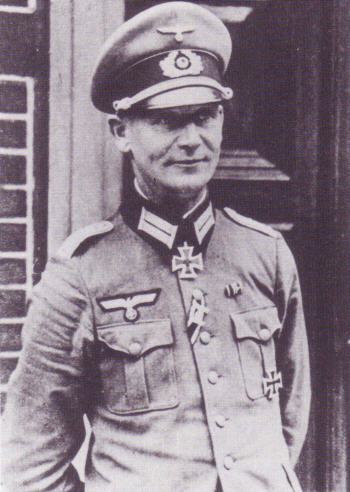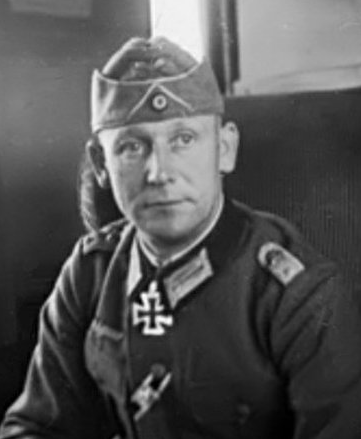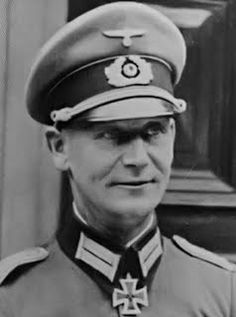Alvermann, Gustav (Infanterie-Regiment 47)
- Date of birth:
- October 9th, 1897 (Ilster/Soltau, Hannover, Germany)
- Date of death:
- June 7th, 1942 (near Kamyshly north-east of Sevastopol/Crimea, Soviet Union)
- Buried on:
- German War Cemetery Sevastopol-Gontscharnoje
Plot: 10. - Nationality:
- German
Biography
Died as Major der Reserve and battalion Kommandeur and was posthumously promoted to Oberstleutnant der Reserve.
Promotions:
1916: Fahnenjunker
27.04.1918: Leutnant d. R.
31.10.1938: Oberleutnant d. R.
15.09.1939: Hauptmann d. R. - Kdr 10./ IR 47
15.10.1940: Major d. R. - Kommandeur I./ IR 47
10.07.1943: Oberstleutnant d. R. (posthumously)
15.03.1916: joined the Heer as Fahnenjunker in the Infanterie-Regiment 19; in the last year of the war he was promoted to Leutnant der Reserve while serving on the Western Front.
1935-1938: completed 5 exercises.
18.08.1939: appointed to the Infanterie-Regiment 47 as Kompanieführer of the 10. Kompanie - Western campaign
1940: As part of the airborne operation above the "fortress Holland "the regiment was supposed to land at Valkenburg airfield and head towards The Hague from there.
The III. Battalion, without the 11th company, was used as the 1st wave. The vanguard was the 6./ FJR 2 plus one platoon coming from the 10./ FJR 2, followed by the rest of the regiment, including the staff and the reconnaissance platoon and the intelligence platoon. However, the Ju 52 machines used get stuck in the mud and so the 2nd Battalion could not be brought in as planned. The main burden of the subsequent battles lay at the 10./ Infanterie Regiment 47 led by Hauptmann d.R. Alvermann remaining alone for the next 5 days fighting to protect the newly taken area, with many soldiers wounded and others killed in action. For the bravery shown in combat and for his leadership that made them secure the Valkenburg airfield considered as a very strategic point, Gustav Alvermann was decorated on May 26, 1940 with the Knight's Cross of the Iron Cross, being one of the first soldiers to be decorated with this one, being promoted to the rank of Major on the same day.
1941: remained in charge of the 10./ IR 47 until the arrival on the Eastern Front where he took command of the I./ IR 47 of the 22. Infantry Division
1942: 22. ID was severely attacked near Sevastopol in the Crimea peninsula
07.06.1942: seriously WIA during the fight for the railway mountain near Kamischly north-east of Sevastopol and due to the severity of his injuries, he did not survive
Do you have more information about this person? Inform us!
- Period:
- First World War (1914-1918)
- Rank:
- Leutnant der Reserve (2nd Lieutenant of Reserves)
- Awarded on:
- July 19th, 1918
- Period:
- First World War (1914-1918)
- Awarded on:
- 1934
- Period:
- Second World War (1939-1945)
- Awarded on:
- May 17th, 1940
- Period:
- Second World War (1939-1945)
- Awarded on:
- May 19th, 1940
- Period:
- Second World War (1939-1945)
- Rank:
- Hauptmann der Reserve (Captain of Reserves)
- Unit:
- Chef, 10. Kompanie, Infanterie-Regiment 47, 22. Infanterie Division
- Awarded on:
- May 26th, 1940
- Period:
- Second World War (1939-1945)
- Awarded on:
- 1942
Sources
- Photo: Historic.de - Militärgeschichte - Bremen und Umland 1933-1945
- Alvermann, Gustav : A
- TITLE - - FELLGIEBEL, W.P., Elite of theThird Reich, Helion & Company Limited, Solihull, 2003.
- THOMAS, FRANZ & WEGMANN, GüNTER, Die Ritterkreuzträger der Deutschen Wehrmacht 1939-1945, Biblio-Verlag, Osnabrück, 1987.
- Detailansicht
- Soldaten im 2. Weltkrieg












